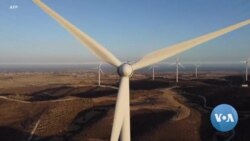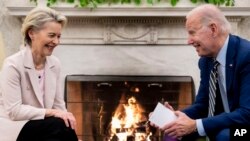United States President Joe Biden and European Commission President Ursula von der Leyen sought to minimize differences over Washington's plans to subsidize American companies under the Inflation Reduction Act that have frustrated many in Europe.
“We're driving new investments to create clean energy industries and jobs, and make sure we have supply chains available” to both continents, Biden said in front of reporters ahead of his meeting with von der Leyen on Friday at the White House.
“And the idea — under that idea is it underpins our — our Inflation Reduction Act, and it lies at the heart of the — your Green Deal Industrial Plan in the EU,” he added, referring to Europe’s roadmap to achieving climate neutrality.
Von der Leyen echoed the sentiment.
“I think it's great that there is such a massive investment in wind and clean technologies now,” she said. “Indeed, we want to match it with the Green Deal Industrial Plan.”
Under the IRA, the administration plans to provide American companies with $369 billion in green subsidies and tax credits aimed at cutting carbon emissions in half by 2030, which the EU views as discriminatory. A special task force was set up in October to address these concerns and avoid a trans-Atlantic subsidy race.
Von der Leyen confirmed that negotiations will begin to allow the EU to have a status similar to that of a U.S. free trade partner so that it may be exempt from an IRA clause that requires a certain percentage of minerals used in manufacturing batteries be domestically produced or come from a free trade partner.
“A few weeks ago, we had already an agreement concerning electric vehicles accessing the American market,” von der Leyen told reporters after her meeting with Biden. “Today, we agreed that we will work on critical raw materials that have been sourced or processed in the European Union and to give them the access to the American market as if they were sourced in the American market.”
Synergy is the mantra, but it remains to be seen how the details will be worked out, said Jackson Janes, a senior fellow at the German Marshall Fund.
“The way that we can get a green technology revolution going on both sides of the Atlantic is to cooperate,” he told VOA. “In other words, not have an IRA over there and an IRA here but to jointly combine forces to make incentives for industry on both sides of the Atlantic to cooperate with each other but also to take advantage of environments on either side of the Atlantic.”
The EU and Canada have been working toward establishing a "green alliance" to grow respective economies that are "climate-neutral, circular and resource-efficient." Biden is expected to coordinate on the effort in his visit to Canada later this month.
'De-risk this dependency'
Amid the war on Ukraine, Europe is racing to end its reliance on Russia for fossil fuels by ramping up its domestic renewable energy production. To do so, it would need more access to critical minerals such as lithium, cobalt and rare earth metals, the majority of which are processed by China.
“China produces 98% of Europe's supplies of rare earths,” von der Leyen said during a recent joint news conference with Canadian Prime Minister Justin Trudeau in Kingston, Ontario. “Europe needs to de-risk this dependency.”
Europe can't cut off its oil and gas dependency on Russia only to repeat it with China on mineral resources, Janes said.
“You've got to figure out a way to cut into that dependency,” he said. “They can do that together if they jointly recognize what they're doing together and don't have to be stymied by domestic hurdles.”
Von der Leyen, however, has been more cautious about joining the Biden administration in warning China not to arm Moscow in its war effort. Asked about the matter on Friday, she said, it is a “bilateral matter of the respective countries.”
Washington is weighing potential sanctions against China should it start sending lethal weapons to assist Russia.
Following Biden’s meeting with German Chancellor Olaf Scholz in Washington last week, his meeting with von der Leyen is the latest in a flurry of high-level diplomacy with European leaders to coordinate support for Ukraine to defend itself in the yearlong Russian invasion.
Last month, Biden traveled to Kyiv to meet with Ukrainian President Volodymyr Zelenskyy, then to Warsaw to visit Polish President Andrzej Duda and leaders of the Bucharest Nine countries of NATO’s easternmost flank.






